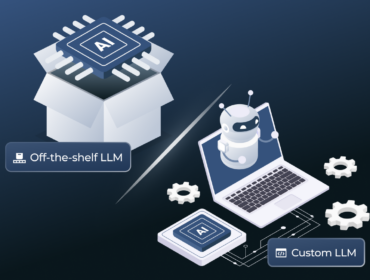Cryptocurrencies are on the rise, attracting investors and traders from all over the world. With Bitcoin hitting the $50k milestone, thousands of newcomers rushed into the crypto market. Because of this, people need access to more platforms for crypto transactions. According to the data provided by Crypto.com, there are more than 106 million crypto traders. The number of daily Bitcoin transactions reached 400,000 in January 2022. With crypto exchanges are on the rise, it’s time to ride the crests of the cryptocurrency market and develop your own crypto exchange. Let’s find out what it takes to develop an exchange from scratch.
What Is a Cryptocurrency Exchange?
First, you need to understand what a cryptocurrency exchange is along with its functionality. In short, it is a trading platform where users have the opportunity to buy, sell, and exchange digital coins and tokens. It’s like a stock exchange, but you buy or sell cryptocurrencies instead of stocks. The exchange guarantees that all trades are executed in accordance with the established rules.
Exchange platforms usually allow traders to perform the following transactions:
- Cryptocurrency to cryptocurrency
- Local fiat to cryptocurrency and vice versa
Types of Cryptocurrency Exchanges
Choosing a type of cryptocurrency exchange is your first step. Lots of things that are vital for development depend on your choice of a crypto exchange platform. These include exchange algorithms, storage, liquidity management, the ability to trade fiat money, etc.
There are three key types of exchange:
- Centralized exchanges (CEX)
- Decentralized exchanges (DEX)
- Hybrids
Centralized exchanges (CEXs)
Centralized exchanges are the most common type of exchange platform governed by a company with a centralized organizational structure. The main advantage of centralized platforms is the speed of crypto transactions and the absence of liquidity issues. As a rule, centralized exchanges offer cryptocurrency transactions in the form of crypto-to-crypto or fiat-to-crypto.
Examples: Coinbase, Kraken, Binance, Gemini, and others
Decentralized exchanges (DEXs)
Decentralized exchanges don’t act as intermediaries to validate transactions as centralized platforms do. Since there are no intermediaries, users can save on commission charges. DEXs just bring buyers and sellers of crypto coins together. They are based on blockchain technology and smart contracts to ensure their high security. While using DEXs, users don’t need to provide any personal data as they ensure the highest level of anonymity. As a rule, there is no dedicated support team that makes DEXs complicated for beginners.
Examples: MDEX, Uniswap, PancakeSwat, and others
Hybrids
Hybrid exchange platforms seek to combine the benefits of both platform types. They are quite new on the market and hybrids have only just begun to disrupt the cryptocurrency market. Hybrid exchanges use blockchain to store transactions like decentralized platforms on the one hand. On the other, they use a centralized server to handle every transaction like centralized platforms. Hybrids offer the security of DEXs and the speed of CEXs.
Examples: Legolas, Eidoo, Qurrex, and others
How to Develop a Cryptocurrency Exchange
Developing a cryptocurrency exchange is a multi-stage process requiring both technical and legal knowledge. Here’s a step-by-step guide on how to enter the cryptocurrency exchange market.
Decide on a type of crypto exchange
The type of a crypto exchange defines the features, and hence, the scope of development. Choosing a type of crypto trading platform plays an essential role in kickstarting your crypto business. There are different types of exchanges. Analyze all their pros and cons, features, and differences to finalize your decision.
Study the licensing issues
Crypto exchanges require a license to conduct crypto transactions and cooperate with banks and payment systems. Note that the work of crypto exchanges is illegal in some countries, including China, Tunisia, Qatar, and others. While choosing a regulation and a country, study all the legal aspects regarding the operation of a cryptocurrency exchange.
Define the architecture of a crypto exchange
You need to define the technical structure of your crypto trading platform as they can vary significantly. As a rule, the architecture of an exchange platform consists of an engine, user interface, wallet, and admin panel.
Determine how you intend to develop your crypto exchange platform
There are two ways to get a crypto exchange developed. You can either develop a custom platform from square one or take advantage of a white-label solution. Both methods have their own pros and cons for you to consider while making your decision. While developing a custom solution, you need to ensure safety and regulatory compliance. An out-of-the-box solution will not only be cheaper to deploy but much faster as well.
Estimate your budget
Developing a crypto exchange requires the coordination and verification of investments as you’ll need to hire developers, testers, marketing specialists, lawyers, and so on. According to some estimates, this can cost up to $500k or even more. Before jumping on the development bandwagon, you need to estimate how much money you will need to bring your idea to market.
Define your choice of crypto assets
It’s better to support a wide range of crypto and fiat currencies. This way, you’ll reach a broader user base and be able to expand quickly. Supporting many of the existing currencies is a real challenge. So start by analyzing your target market and singling out a few cryptocurrencies to start with.
Secure your platform
Even the biggest players on the market can’t always prevent external attacks. That’s why the question of security shouldn’t be overlooked. You need to find ways to secure the funds on your exchange using multiple methods.
Test and launch your crypto exchange
Before launching a platform, you need to ensure it is error-free and running smoothly. If the testing process is ok, your crypto exchange platform is ready to go live and welcome users.
Wrapping Up
The cryptocurrency exchange market continues to grow at a blistering pace. The popularity of cryptocurrencies, peaking Bitcoin prices, and political challenges are facilitating the rise of the crypto world. Every day, more new players are appearing on the crypto market, fighting for their place in the spotlight. You need to provide extra value that will lure users to your crypto platform instead of Binance or CoinBase.
We can help you start a crypto exchange business by taking all the technical work off your hands. At Unicsoft, our specialists have a growing history of delivering complex software solutions. Contact us to get a free estimate for your crypto exchange project.





![How to Develop a Cryptocurrency Exchange In 2023 What’s the EU Artificial Intelligence Act and How to Comply? [Webinar]](https://unicsoft.com/wp-content/uploads/2024/03/Cover_1140_v1.1-370x280.png)

